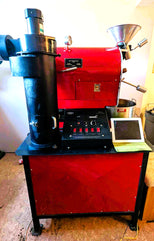
Guide to Buy a Used Coffee Roaster: Tips for Smart Buyers
Buying a coffee roaster isn’t just about owning a machine; it’s about controlling the flavor, aroma, and consistency of every batch you produce. Whether you’re upgrading your setup or looking for your very first roaster, you must learn what to look for can save you both money and headaches.
However, many people feel unsure when faced with so many options for used roasters. It's also important to know what questions to ask and what to look for. Even beginners can make smart choices with a little help.
This blog covers simple steps for buying a used coffee roaster safely. You will learn about sizes, brands, inspections, and costs, all explained in one place.
Key Takeaways
Save money and still get reliable, high-quality coffee roasters.
Choose roaster size based on your café or business needs.
Check space, ventilation, and utilities before final purchase decision.
Research trusted brands like Probat, Diedrich, and Giesen carefully.
Always ask the seller about usage history, maintenance, and included parts.
Inspect the condition closely and request a live test roast demo.
Calculate total costs including shipping, installation, and possible repairs.
Avoid mistakes like ignoring history, safety checks, or hidden damages.
Benefits of Buying a Used Coffee Roaster
A used coffee roaster gives you great value for less money, and you can still get a machine that works perfectly for your needs. Let’s check out why a second-hand coffee roaster can be worth considering:

Save a Lot of Money
Used coffee roasters usually cost much less than new ones. It means you can avoid the big price drop that happens as soon as a new machine leaves the store. The money you save can go toward beans, marketing, or other parts of your business.
Access Better Models
Sometimes, a used unit lets you afford a top-level brand or model that would be too expensive when new. With used roasters, you can enjoy advanced features and better build quality without overspending.
Good for the Planet
Buying second hand gives a coffee roaster machine a new life instead of letting it go to waste. It helps reduce the demand for new manufacturing and keeps good equipment out of landfills.
Get It Faster
Many used roasters are ready to ship right away. It can save you months of waiting for a new machine to be made and delivered. So, you can get a working machine in no time.
Proven in Real Use
A used roaster has already been tested in real coffee roasting work. If it’s still in good shape, you can trust that it’s capable of handling regular use.
Guide to Buy a Used Coffee Roaster
Choosing the right used coffee roaster can feel like a big task, but breaking it into steps makes it much easier. A little research and careful checking can save you money, time, and future headaches. Here’s a simple guide to help you choose wisely.

Match Capacity to Your Needs
Think about how much coffee you plan to roast at one time and how often you will roast. For example, if you run a small café that serves coffee on-site, a 1 to 3 kg roaster is usually enough. If you plan to supply multiple cafés or sell in bulk, a 5 to 15 kg roaster is more practical. Large wholesale businesses often use 20 kg+ machines.
Choosing the wrong size can create problems, too small, and you’ll spend all day roasting; too big, and you’ll waste energy, space, and money.
Confirm Space & Utility Requirements
A coffee roaster needs more than just floor space. This fact is even more complicated when it's about commercial coffee roaster storage. Check that your location can handle:
Ventilation: Roasters create smoke that must be safely vented outside.
Gas supply or electricity: Some use gas, others use electricity. So, you should make sure your setup matches the machine.
Room for cooling trays and afterburners: These are sometimes separate parts that also need space.
Research Brands & Model Reliability
Not all roasters are the same. Some brands have a long history of making machines that last for decades, while others may have issues or be harder to repair. You should read reviews, talk to other roasters, and check if parts are easy to find.
Popular names like Probat, Diedrich, and Giesen are known for quality, but even within a brand, some models are better suited for certain uses.
Ask the Right Seller Questions
When talking to the seller, don’t just ask about the price. Get details that help you understand the machine’s history:
Why are you selling it?
How often was it used?
Was it serviced regularly?
Were there any major repairs or changes?
Are all parts included (control panels, cooling trays, afterburners)?
Clear answers can help you decide if the roaster is worth the price.
Inspect Condition Thoroughly
Look closely at the machine before you buy. You must check for rust, cracks, or signs of poor care. Test the buttons, levers, and moving parts. If possible, have a technician check the inside for:
Chaff buildup (leftover coffee skin that can cause fires)
Burnt wires or overheating damage
Problems with burners, fans, or motors
A clean and well-kept roaster usually means it was cared for.
Request a Test Roast or Video Proof
A working demonstration is the best way to see if the roaster is in good condition. If you can’t be there in person, ask for a video showing the machine heating up, roasting beans, and cooling them down.
You should pay attention to how quickly it reaches roasting temperature and whether it holds that temperature without problems.
Evaluate Total Cost and Negotiate
The price tag is not the only cost you may have to pay. There could be more expenses, like:
Repairs you might need after buying.
Shipping and crating these machines are heavy and can be expensive to move.
Installation costs for gas lines, ventilation, or electrical work.
Once you know all the costs, you can make a fair offer. If you find problems during inspection, use them to negotiate a lower price.
Common Mistakes to Avoid When Buying Used Coffee Roasters
Buying a used coffee roaster can be a great choice, but it also comes with some risks.
While buying a used roaster, people often make mistakes like ignoring it’s history, skipping the regulatory fact check, not checking the damaged part, or not negotiating. Let’s learn more about the common mistakes while buying a used coffee roaster:

Ignoring the Roaster’s History
One big mistake is buying without knowing how the machine was used or cared for. Machines with heavy use or poor maintenance can have hidden problems. You should always ask for service records or details about past repairs to understand the roaster’s condition better.
Overlooking Safety and Emission Rules
Older roasters might not meet today’s safety or environmental rules. This condition can cause legal trouble or extra costs if you need to upgrade the machine later. So, you must check your local regulations before buying to avoid surprises.
Missing Hidden Damage
Some problems, like rust or worn motors, may not be obvious at first. They can show up only after you start using the roaster. You must carefully inspect the machine or hire a professional to avoid costly repairs.
Forgetting About Warranty and Support
Many used coffee roasters are sold “as-is,” meaning no warranty or help if something breaks. Unless you buy a second-hand coffee roaster from a trusted seller who offers service plans, you might have to pay out of pocket for repairs.
Not Budgeting for Extra Costs
Besides the price of the roaster, you should plan for shipping, installation, and possible repairs. If you ignore these costs, it can make a used coffee roaster more expensive than you expect.
Where to Buy a Used Coffee Roaster
Finding a reliable place to buy a used coffee roaster for sale is very important. Some trusted sellers and sources include:
CoffeeTec: A certified coffee roaster reseller offering refurbished roasters with clear pricing, support, and shipping assistance to make buying safer and easier.
Mill City Roasters: Occasionally lists used machines and offers warranty options.
San Franciscan Roaster Co.: Provide used and refurbished coffee roaster at reasonable pricings.
You can also explore online marketplaces like eBay and Craigslist, but be cautious. These sites may have lower prices but carry higher risks. Always inspect the machine or use escrow services when buying from these platforms.
Industry forums like Home-Barista and Roast Magazine classifieds are great places to find honest reviews and occasional listings from other coffee professionals.
Should You Buy Used or New?
Deciding between a new and a used coffee roaster depends on your budget and needs. New roasters come with the latest features and full warranties, thus giving you peace of mind. However, they often cost much more and can take a long time to arrive.
Buying a used roaster can save you a lot of money. You might get a high-quality machine that still works great without paying the full new price. If you choose a trusted seller like CoffeeTec, you can even find refurbished roasters with some warranty and support, so it makes the purchase safer.
For many small businesses and beginners, used roasters offer a good balance of quality and cost. Just make sure to do your research and check the machine carefully before buying. This way, you get a reliable second hand coffee roaster that fits your budget and helps grow your coffee business.
Final Thought
A used coffee roaster can be a great investment when you check the important details like aroma, flavor, and ask the right questions. Choosing the right size, brand, and condition will help you get a machine that fits your needs and budget.
So, you must take your time and do your research carefully. Hopefully, this guide will help you buy a used coffee roaster with confidence. A smart choice will lead you to many successful coffee roasts ahead.
FAQs
Is it safe to buy a used coffee roaster?+
Yes, it can be safe to buy a used coffee roaster if you carefully inspect the machine and buy from a trusted seller. Make sure to check its condition and ask for a test roast to avoid future problems.
Is coffee roasting a profitable business?+
Yes, coffee roasting can be profitable with the right equipment and good beans. Your success in the coffee roasting business depends on quality, marketing, and managing costs. Starting small and growing carefully helps build a strong business over time.
How often should I clean a coffee roaster?+
You should clean your coffee roaster after every few roasting sessions. Regular cleaning prevents the buildup of oils and chaff. Also, it keeps the machine safe and makes sure your coffee tastes fresh every time.


Leave a comment